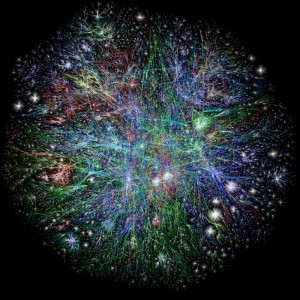Today we wish a very happy 50th birthday to the internet. In truth, pinning down an exact date for the birth of the internet isn’t really possible, but Wired magazine suggests today’s as good a day as any to celebrate; for it was on the 7th of April, way back in 1969, that the first RFC – Request For Comment – documents were published. RFC documents describe the theoretical foundations of the internet and interconnected computers. They outline the methodologies involved, the research being undertaken and any new concepts developed in the field of computer networking.
The first RFC documents were published as part of ARPANET (Advanced Research Projects Agency Network). This was an academic programme drawing on ideas first proposed by the US Defence Department almost two decades earlier. The aim of ARPANET can be summed up by this quote from the visionary psychologist and computer scientist, Joseph Linklider,
[to create] a network of [computers], connected to one another by wide-band communication lines providing the functions of present-day libraries together with anticipated advances in information storage and retrieval and [other] symbiotic functions.
Back in 1960 Linklider had published a paper entitled “Man-Computer Symbiosis”. In it he called into question the rather fashionable theorising about Artificial Intelligence that was prevalent at the time. Instead of spending time building a mechanical brain, Linklider suggested a far more useful goal would be to use computer networks to link together human brains. Computer networks, he believed, had the potential to bring many millions of human minds together inside the largest library ever conceived. Linklider’s contemporary, W.R. Ashby suggested that this would result in what he called “intelligence amplification”. What wonders would such technology enable us to achieve!?
Well, if we fast-forward 50 years, we might be forgiven a small sigh of disappointment. Linklider’s vision of a golden age of human discourse, knowledge and understanding appears to have sunk beneath an ocean of pornography, gambling and home-shopping. The internet may well be the largest library ever conceived, but it’s a library where almost 15 percent of the books are filled with images of people having sex. A library with the ambience of a grubby shopping mall and the attitude of a casino. A library where intellectual discussion is often drowned out by vitriolic shrieking. Every depravity, every cruelty, every human frailty can be found writ large on the walls of our global library. It houses enough hatred and intolerance to shock even the most cynical.
And yet, though that may all be true, it’s far from being the whole truth. The pace of technological progress over the past hundred years has been dizzying. My grandmother was in her teens before she encountered an electric light. Yet by the time of her death she’d watched a man walk on the moon and seen her grandson playing games on his own personal computer. James Gleick’s seminal book, Faster: the acceleration of just about everything, suggests that while technology itself can be alienating, the pace of technological change massively compounds that alienation. Albert Einstein described technological progress as “like an axe in the hands of a pathological criminal”, while anthropologist and psychologist Gregory Bateson goes further and insists that modern technology is itself pathological… the externalisation of a deeply flawed view of ourselves and of the world of which we are part.
But at the same time, with the arrival of the internet and our mass participation in its development, we have a revolutionary technology with the potential to trump all others. Despite the million YouTube videos of cats doing something amusing; despite the message boards filled with petty arguments and vicious insults; despite the porn and the rampant consumerism, the casinos and the privacy concerns. Despite all of this and worse, the internet is undoubtedly capable of the intelligence amplification envisioned by William Ashby. Because above all, what the internet provides us with is a space where millions can gather and share information freely. A space that is democratic in the purest sense. A space where ideas can be expressed, challenged and reshaped by a collective consciousness that spans continents. Even ideas about technology, progress and the internet itself. Curiously enough, the net may prove to be the piece of technology that allows us to assess the impact of technology on our world.
We see glimpses of this revolutionary potential already. Protest movements and pressure groups have found the net to be a powerful organisational tool. Indeed, the recent and ongoing revolutions in North Africa were coordinated – in part at least – through social media websites. Wikileaks, for all its many faults, has shaken the political establishment around the world. Research in almost any field you care to mention has been aided by the collaborative space provided by the net. And just as hatred breeds freely in cyberspace, so there are wonderful stories of hope, love and solidarity emerging from the electronic ether facilitated by encounters between like-minded people who would otherwise never have met.
Ultimately, despite the conceptual framework entering middle-age, the internet as a collaborative space involving mass participation is still very much an adolescent. It’s future is still unwritten, but there’s plenty of reason for optimism. When people gather together it’s often to work or to play. And yes, sometimes when they gather they form a lynch-mob. But occasionally, when minds meet, something truly wonderful is produced. The internet offers us the facility to meet in our millions. In our tens of millions. And even though most of the time we meet in such numbers we’re watching a Rick Astley video, it only takes one “something truly wonderful” to change the world forever.
[Written by Jim Bliss]



7 Responses to 7th April 1969 – “The Birth of the Internet”